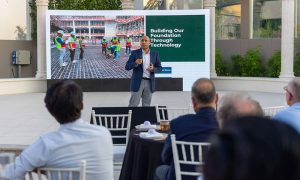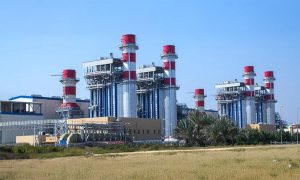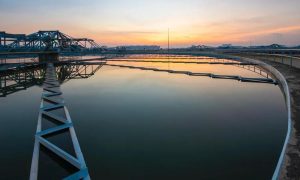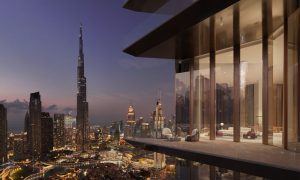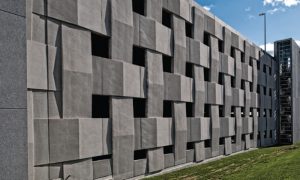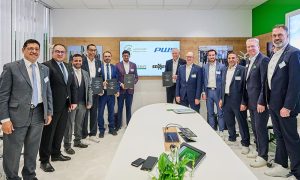Contractors of the New Age
In conversation with UrbaCon Trading and Contracting’s CEO, Moutaz Al Khayyat

A visitor to Doha in 2004 would have seen a very different city. 10 years ago, a number of the buildings that dot the West Bay area did not exist, while the network of roads and flyovers were far smaller than they are today.
Now-a-days, a visitor to the Qatari capital can drive along a sweeping corniche that affords him or her an expansive view of a rapidly changing capital city that has become home to some of the most interesting and exciting architecture projects in the world.
Although the majority of the world focused its attention on Qatar after it won the right to host the 2022 FIFA World Cup, it would be fair to say that this is a country that has been undergoing change for far longer than has been advertised.
With its rulers determined to build Doha into a city that will rival its Gulf neighbours, there were – and are – tremendous opportunities available to construction companies looking to break into an exciting, soon-to-be-booming market.
Sensing this opportunity, three years ago UrbaCon Trading & Contracting LLC (UCC) came to Qatar, looking to get in ahead of the competition and establish itself as the ‘go-to’ firm in the local market.
Having helped his company win contracts that cover the entire spectrum of the construction industry (hospitality, retail, commercial and infrastructure being the prominent sectors), says Moutaz Al Khayyat, chief executive officer of the contractor, who sat down with Big Project ME to discuss UrbaCon’s strategy for the future and how it hopes to become a figurehead for the Qatari construction industry.
“We’re relatively new to the Qatari market,” he says. “Our company just celebrated its third anniversary of being in Qatar. 2013 was a very good year for us. We increased our company-wide turnover, grew our professional staff to 2,400 and our skilled and unskilled labour forces grew dramatically to 20,000 to handle the current contracts, and we’re adding to that every day to meet our demands for our larger projects that are in the pipeline.”
Al Khayyat points out that part of UCC’s mandate is to provide turnkey services for a number of different project types, highlighting the scope of the contractor’s ambitions in the Qatar market.
“We’are about to finish the Banana Island Resort, Doha by Anantara project. The Banana Island fishing area has been developed into a luxury Maldivian-style resort. Just five minutes west of Education City, one can now see the structure for the Mall of Qatar, a $1.09 billion project that we will finish by Q4 2015,” he relates.
We are hoping to obtain a fair share of the many infrastructure projects being tendered by the Qatar Agencies. We have been prequalified for the many infrastructure projects. We’re bidding on all of those, and we’ve been prequalified in some cases with Joint-Venture partners. We’ve been successful in being award the traffic management system building at the internal securities forces project, a new building that houses the traffic controls of the city to have smart traffic management throughout the whole country.
There are a number of hospitality projects going on, we have the 186 room Hilton Double Tree Suites in Old Salata. A number of other hotel resort projects north of the city are also in planning and will start construction in the next 12 months.
In addition, we’re building two residential towers and an office building in Lusail is under development. So we’re doing a wide range of projects, including major marine works for dredging channels and ports in northern Qatar,” he outlines further.
Given the scope of the company’s work, it behoves the question as to how they managed to grow so quickly and so successfully. When asked this, Al Khayyat is quick to point out that despite the rapid growth, the company’s success is built on old-fashioned values.
“Our strategy is to continue building trust with our current clients. We wish to maintain a strong relationship with our clients to continue more works in the private sector, which contributes to a large portion of our portfolio. Meanwhile we will be competitive in winning public works contracts. We’re hoping that within two to three years, our private works contract and our public works contracts are about 50/50.” he asserts. &ldquo For the contracts we have underway we will continue to provide top quality construction on time and in budget for our clients.
“We will continue to have major joint-ventures with partners to tender the works coming from, the Harbour crossing and other major infrastructure projects. We bring significant value to our partners as we can provide trained local labour, logistics support and veteran Qatar experienced professionals while we will rely on the partners bringing in the experience for the technical engineering solutions for these challenging projects,” Al Khayyat explains.
“With the JV partners providing the technical know-how and the years of experience with the complicated technical portions of these projects, we can bring in the general contracting, the labour forces and general management needed for these major jobs,” he reasserts.
Despite the Qatari market being one of the fastest growing construction sectors in the world, Al Khayyat is quick to offer a note of caution. Speaking as a local contractor who has been involved in a number of major projects, both without and with UrbaCon, he says contractors have to be careful about what kind of work they’re bidding on.
He explains that he’s seen numerous projects where the contractor has been pre-qualified but hasn’t had the necessary numbers in staff or adequate amount of resources to complete the project.
“Qatar agencies are taking tremendous advantage of the international conglomerates that are competing on the local scene. Notwithstanding that you may be a strong local contractor; you’re competing worldwide with Korea, China, Europe, Turkey and others. So it is by far not just a local competition to win contracts. Just because you’re a local entity, it does not give you any favouritism. One needs to have a strong ally with a JV Partner who has the technical expertise in constructing these highly complex infrastructure projects to further be successful.”
“The amount of work that’s out there is very abundant, and you have to be very careful about bidding for work that you feel you will be pre-qualified for and that you have the experienced staff and resources (with your joint venture partner) to compete,” he reiterates.
Something else that is preoccupying Al Khayyat’s thoughts, almost as much as managing the growth of UrbaCon’s projects and the need to establish itself in the Qatari market, is ensuring that his company sets an example when it comes to health and safety on its construction sites.
Given the criticism that Qatar has endured over the treatment of construction workers working on its projects, it’s easy to be cynical and dismissive of his claims. However, he insists that UrbaCon is actually ahead of the curve when it comes to labour welfare and reform, a statement which is backed up by the number of subcontractors and contractors following their lead, he says.
“Actually many of conditions that the law has required to improve the HSE of labour is having a nominal effect on us because of the high standard we implemented as a relatively new contractor. Our camps are all new, state-of-art-facilities, with well-equipped buses, and the latest in food service and housing conditions. We believe that providing skilled and unskilled labour with the proper housing, and more importantly providing them with a safe project is what allows you to retain these men from project to project. The loyalties go both ways. So we have to show our loyalty through very strict safety and health standards and in return, they show their loyalty by staying with us with quality work and performance,” he claims.
“We’ve been doing very well. We’ve had a minimal turnover of labour and we have very up to date, state-of-art labour accommodations. For example, recently, auditors from Europe praised for the quality of our housing accommodations that we’re providing for the Mall of Qatar project.”
“Thankfully our HSE accident record has been A+. We hope to continue to keep that record up, but it’s an everyday management and labour objective requiring intense supervision and training to maintain safety,” Al Khayyat asserts passionately.
So successful has this approach been, the CEO claims that other contractors and subcontractors have begun to take note of their approach and adopt them on other projects and sites.
“Yes, this attitude will spread, because everyone in Qatar is committed to make this a safe working environment. All contractors and projects have an influence on the reputation of the country so we all must be insistent on high HSE standards,” he insists.
As construction work steps up, with contracts announced for the first World Cup stadium and other projects in the pipeline, this is welcome news indeed. What the boom also means is that the need for staff and labour is set to increase tenfold. Contractors have to be prepared for the amount of work that is going to hit them, Al Khayyat warns.
This is something that he’s already preparing for, as referred to earlier, with the buildup in workforce numbers. This preparation work is crucial for the success of his company, he insists.
“The demands on labour and the demands on professional staff are going to…and have already…dramatically change in 2014 as compared to 2013. We have noticed this already. We hire a lot of the key staff in the company and with the resurgence of work in Dubai; it is increasingly harder to attract talent to this area. It’s just a given that there’s going to be more competition for Qatar to attract talent to achieve these larger complex projects,” he points out.
“However, Qatar is always going to have advantages in attract the worldwide talent because of the pure complexity and quality of the projects that we’re building. Professionals will look at the projects that the private sector and government is rolling out, they’re all iconic, world-class and significant infrastructure projects.
“Engineers, architects and professionals in the building business will make their career decisions based on where they want to go by participating in the world’s best projects,” he asserts.
“Qatar’s projects and volume of work is absolutely outstanding and this will be our advantage as competition increases, the man from UrbaCon predicts confidently.


